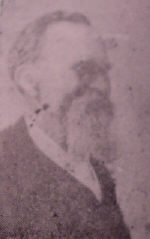 SMITH, THOMAS INGLES (?-1847). Thomas I. (often J.) Smith, Texas
Ranger and Indian agent, was born in Tennessee and immigrated to
Texas in 1836 after the battle of San Jacintoqvas a volunteer in Brig. Gen. Felix Huston'sqv
Army of the Republic of Texas.qv
In response to the raids of Rafael Vásquez and Adrián Wollqvon San Antonio in 1842, Smith enlisted as a private in Capt. John
Rugeley'sqv company of volunteers
in Col. Clark L. Owen'sqv
regiment; he served from March 6 through April 13, 1842. He was
wounded at the battle of Salado Creekqvon September 18, 1842. On October 17, 1842, with the announcement of
the Somervell expedition,qv Smith
enlisted as a private in Capt. Samuel Bogart's company of Col. James
R. Cooke'sqv First Regiment of the
South Western Army. On November 9, 1842, he joined Capt. William S.
Fisher'sqv company of the Second
Regiment and was elected third lieutenant. He accompanied the
expedition to the Rio Grande but returned to San Antonio with Gen.
Alexander Somervellqv and thus did
not participate in the battle of Mier and was spared capture on the
Mier expedition.qv In 1843 Smith
was appointed by Governor Sam Houstonqv to organize and take charge of the party that removed the archives
from Austin to Houston (see ARCHIVE WAR). Later that year he
moved to a farm on Chambers Creek in Ellis County. In 1844 he led a
scouting party into the Wichita Mountains in search of hostile
Indians. From February 16 through December 16, 1845, a Thomas J.
Smith served as lieutenant commanding the Robertson County Rangers. SMITH, THOMAS INGLES (?-1847). Thomas I. (often J.) Smith, Texas
Ranger and Indian agent, was born in Tennessee and immigrated to
Texas in 1836 after the battle of San Jacintoqvas a volunteer in Brig. Gen. Felix Huston'sqv
Army of the Republic of Texas.qv
In response to the raids of Rafael Vásquez and Adrián Wollqvon San Antonio in 1842, Smith enlisted as a private in Capt. John
Rugeley'sqv company of volunteers
in Col. Clark L. Owen'sqv
regiment; he served from March 6 through April 13, 1842. He was
wounded at the battle of Salado Creekqvon September 18, 1842. On October 17, 1842, with the announcement of
the Somervell expedition,qv Smith
enlisted as a private in Capt. Samuel Bogart's company of Col. James
R. Cooke'sqv First Regiment of the
South Western Army. On November 9, 1842, he joined Capt. William S.
Fisher'sqv company of the Second
Regiment and was elected third lieutenant. He accompanied the
expedition to the Rio Grande but returned to San Antonio with Gen.
Alexander Somervellqv and thus did
not participate in the battle of Mier and was spared capture on the
Mier expedition.qv In 1843 Smith
was appointed by Governor Sam Houstonqv to organize and take charge of the party that removed the archives
from Austin to Houston (see ARCHIVE WAR). Later that year he
moved to a farm on Chambers Creek in Ellis County. In 1844 he led a
scouting party into the Wichita Mountains in search of hostile
Indians. From February 16 through December 16, 1845, a Thomas J.
Smith served as lieutenant commanding the Robertson County Rangers.On September 8, 1845, Smith, James Clinton Neill, and Edwin Morehouseqv were appointed to meet with representatives of the Comanche, Caddo, Cherokee, Delaware, Ionie, Lipan, and Tonkawa tribes to work out a treaty of peace. After a series of councils on the Brazos River from September 12 through 21 the Indians agreed to return stolen property and discontinue their raids on settlements. Later that season Smith and George Whitfield Terrellqv were appointed commissioners to the Waco, Wichita, and Keechi Indians. The treaty of "peace, friendship, and commerce" that resulted from their efforts was signed on Tehuacana Creek near Waco on November 16, 1845, the last Indian treaty formulated by the Republic of Texas. On August 2, 1846, with the outbreak of the Mexican War,qv Smith raised a company of volunteers. In April 1847 he defeated Henry E. McCullochqv in the election for command of the battalion and the rank of major. Smith's Battalion, Texas Mounted Volunteers, spent the war defending the western frontier against Indian raids. The battalion mustered out of federal service on August 17, 1847. After the war Smith continued in ranger service, commanding a company on Richland Creek. He married Mary Louise (Bartlett) O'Neill, the widow of John C. O'Neill. They had three children. Smith died in Austin in 1847. BIBLIOGRAPHY: John S. Ford, Rip Ford's Texas, ed. Stephen B. Oates (Austin: University of Texas Press, 1963). Frances Terry Ingmire, Texas Ranger Service Records, 1830-1846 (St. Louis, 1982). Joseph Milton Nance, Attack and Counterattack: The Texas-Mexican Frontier, 1842 (Austin: University of Texas Press, 1964). Charles D. Spurlin, comp., Texas Veterans in the Mexican War: Muster Rolls of Texas Military Units (Victoria, Texas, 1984). Homer S. Thrall, A Pictorial History of Texas (St. Louis: Thompson, 1879). Walter Prescott Webb, "The Last Treaty of the Republic of Texas," Southwestern Historical Quarterly25 (January 1922). Amelia W. Williams and Eugene C. Barker, eds., The Writings of Sam Houston, 1813-1863 (8 vols., Austin: University of Texas Press, 1938-43; rpt., Austin and New York: Pemberton Press, 1970). Thomas W. Cutrer |